
davicus
-
Posts
33 -
Joined
-
Last visited
Content Type
Profiles
Forums
Store
Help Articles
Posts posted by davicus
-
-
I am working on my bar layout right now... what are your feelings on Krowne MultiStations? I've got a lead on some used ones - the type with the ice bin, small area for prep and a double speed rail. i am going to try to fit four in, so my front bar will look like:
glass rack
multi station
hand wash sink
multi station
glass rack
quad sink
glass rack
multi station
hand wash sink
multi station
glass rack
my back bar will have two three door coolers, and two small reach in freezers. ice machine is going in the basement.
my bar is long and skinny, so i am thinking this will work. dunno. thoughts? comments?
-
Wifey and I stopped in Nashville on our way back up north just to check out TPH.... Had a slew of drinks, all well made, excellent looking place, knowledgeable staff, definitely worth the effort. Also, Josh went out of his way to get us reservations at a great restaurant, last minute. Thanks for the hospitality!
-
While we're talking about it (sort of), I really like a Brooklyn variation, subbing the Amer Picon with Averna:
3 oz. Overholt 80*
.75 oz. NP Original
.5 oz. Averna
1/2 barspoon Luxardo M
dash Ango Orange
dash Ango
-
I find a Ransom / Carpano Antica Negroni to be a thing of wonder. All subsequent Negronis seem flat, boring. But then again, I'm not really one for subtlety.
-
Heading to Savannah in a few weeks... looking for some recommendations on high quality craft cocktail bars, along the lines of M&H, PDT, TVH, etc. Thanks!
-
FWIW, after tasting the house made Amer Picon at TVH, I've found Tornai is a bit closer after adding a few dashes of orange bitters and a bit of simple syrup. Boosts the orange, cuts that strangeness that seems to pop up on the end.
If they added a little aloe to it, I don't see why it couldn't serve a dual purpose! -
Green. I may actually have to go back tonight.
-
I had a Sazerac at TVH last night made with a rye that I can't seem to find. I thought he said it was a Buffalo Trace brand but I'm not sure if it's Eagle or Weller or what... I know he said it was 114* - and each year it's made the proof varies... and it definitely wasn't old grand dad 114. Any ideas?
Incidentally, it was rinsed with chartreuse instead of absinthe. Oh dude.
edit: looks like it was a Thomas Handy 2008 release. Wow.
-
Lovage is all caramel, cedar, and oak on the nose, and the same with a more pronounced woody bitterness on the tongue. Another winner.
This is interesting. I really like lovage. Do you know whether this was the root, or the stem and leaves, or the seeds of the lovage plant? I ask because lovage leaves and stems have a kind of herbal celery flavor that is nothing like what you describe.
This brings me to another thought about bitters in general, which is the idea of perhaps including a fresh infusion as part of the recipe. For example, you could take fresh lovage leaves, infuse them into grain alcohol, steep, remove, add more leaves, steep, remove, add more leaves, etc. until the alcohol became saturated with the lovage oils -- and then you could use the intense lovage infusion in your bitters. As an added bonus, this kind of infusion into grain alcohol will maintain its intense green color more or less indefinitely. If you kept the bitters at a high proof, you could have a great color.
Sam, i think this is a great idea. i'm doing lemon grass bitters which use a lemon grass in 151 rum infusion as the flavoring component, but i've found after a few weeks the booze stops gaining flavor and plateaus - which limits the final flavor of the bitters. i think i'll remove the old lemon grass and add some fresh stuff tonight.
-
Got a few new shakers today... excuse the patina, I just pulled them out of the boxes.
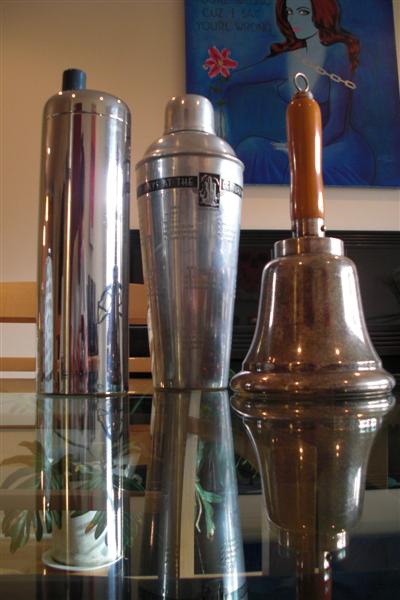
But this little beauty is the belle of the ball:
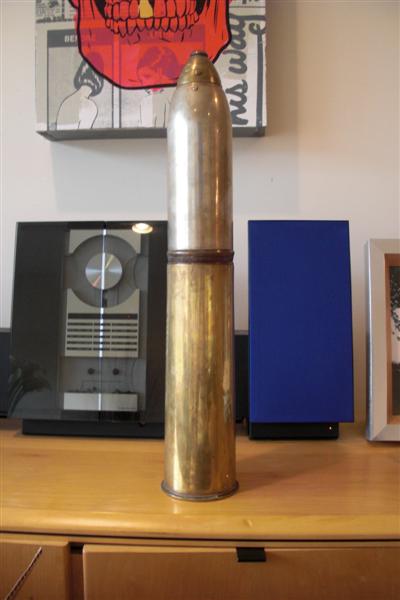
Top is a three piece shaker with a strainer in the cap, bottom holds a rack with four cups.
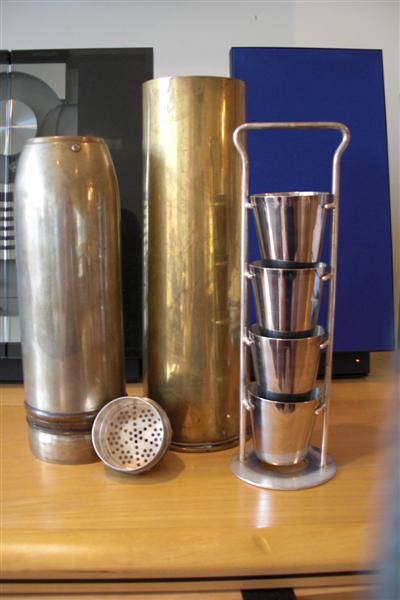
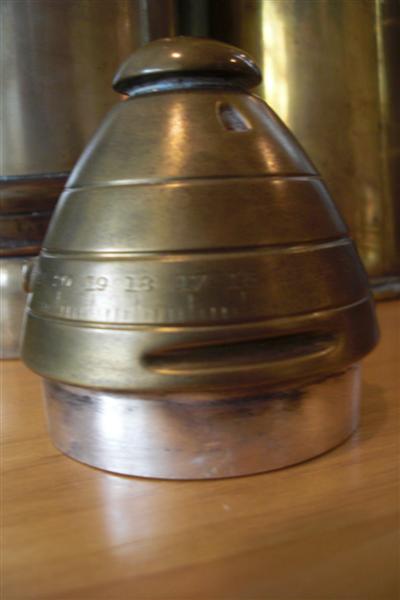
-
Special shipment from CA this afternoon containing two bottles of Torani Amer! Just made a Liberal with overholt, carpano antica, torani amer (3:1:1), with a dash of Ango orange. Really, really nice. Going to get a bottle of Noilly Prat Original for some Brooklyns.
So yes, it's a pretty big day for me.
-
I've been doing this with Le Tourangelle oils, but the general consensus is the resulting liquor is too oily. I've had better results with the fat wash method, using butter or crisco.
I posted in the nut infusions topic in greater detail, if looking for specifics.
-
And now Fiddleheads is gone.The stylish, casually upscale Fiddleheads restaurant in Royal Oak will close at the end of business Saturday, owner Colette Farris said today.
“The economy is terrible, and a very unfortunate financial decision had to be made,” she said.
Sad.
This sucks. Fiddleheads was one of the few great spots in Metro D.
-
my bittering compound is 750 ml of rye with half a tablespoon each of wormwood, gentian and calmus. the last batch turned out pretty well, as the rye is very bitter but doesn't have (very much) the harsh earthy flavor of the root. i haven't infused any of these separately, so if you find that one has a stronger taste than the other, maybe i'll eliminate that element.
maybe i do need to let the flavoring portion infuse longer get more intense. i've got a bad habit of tasting my infusions a little too often.
again, i've had some really good results, but none have had the intensity of an ango, etc. the coffee bitters should be done mid week. i'll post results.
-
Chris, I'm very interested in hearing about your results... I just picked up some sapsarilla root a few days ago. Planning to macerate in 151 rum for a root beer bitters result.
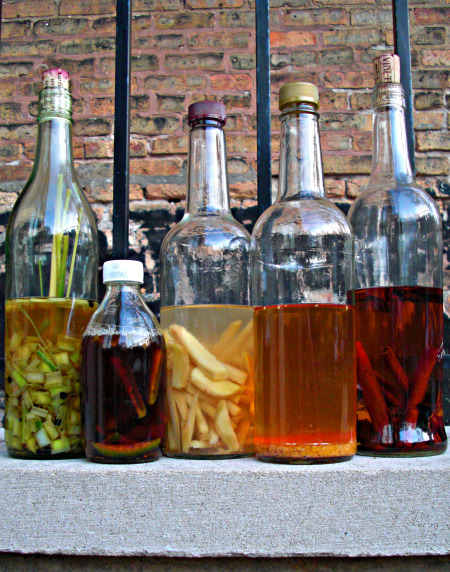
Tinctures in progress. From left: lemon grass & black pepper in 151 rum, bird's eye peppers in bitter rye solution, ginger in 151 everclear, seville orange in everclear, seven spice rum mixture. I've also got some coffee bitters in progress, as well as a bitter molasses mix.
When making bitters, I've come across a few problems. The first is the taste of the bittering agents (calmus, wormwood, etc.) influencing the end product. It seems to be a difficult balance of achieving suitable bitterness without having to mask the taste of the root. Second problem is the strength of the primary flavoring ingredient. Despite my best efforts, none of my bitters have the intensity of flavor that i need, and i have to use quite a bit in each drink to get the flavor across.
-
While I've never had Junipero, I like Pink Gin when I want to really taste a new gin. And, pretty much any bartender can make it.
gin
a few dashes of ango
stir
serve up
How to mix Junipero?I almost started a new topic but, after some diligent searching, figured I could revive this one.
My impetus is an upcoming long sojourn in the San Francisco airport. I scoped a little on my way west and found that Anchor has a bar with Junipero martinis on the menu. So, not being much of a martini drinker but wanting to try Junipero, how do I get a good one? Is this gin best mixed dry or wet or what?
I found references to Junipero in a number of other threads with Aviations and Last Words mentioned as good Junipero drinks but I'm not sure I could get them at an airport bar. Does anyone have other favorite Junipero cocktails/drinks?
Thanks for any help making my 6 1/2 hour layover more pleasant.
-
Bottomless Bitters
Jamie Boudreau has an excellent post I’ve used to develop the following outline for a bottomless bottle of bitters. The general idea is to make a few different infusions and mix them together for the desired flavor.
1. Bitter Mixture: The bitter mixture is going to give the final product it’s bitter taste (duh). It should consist of a high proof liquor (I’ve used 100* rye and 151* rum) along with the bittering agent. I have found ½ tbsp each of gentian, calmus and wormwood is sufficient to achieve an extremely bitter mixture (There also doesn’t seem to be too much difference between the bittering agents in terms of flavor - if you’ve only got wormwood, don’t sweat it – but only use 1 tbsp. per 750 ml bottle, as wormwood is the most bitter). Also, if you use too much bittering agent or let it sit for too long, it starts to get a dirty taste that becomes tough to mask. (This happened to my first batch, and I was able to make my Bird’s Eye bitters with it, but not much else). A week of macerating should do the trick – after that strain out the bitters and keep the mixture in a sealed bottle.
2. Primary Flavoring Mixture: This mixture is going to be where the main flavor of the final product comes from. I’ve found it best to get as overwhelmingly powerful of a flavor as possible in this mixture so the bitters don’t get lost in the drink. My lemongrass bitters consisted of ¼ lb. of ground lemongrass and black pepper which was macerated in 350 ml of 151* rum for about ten days, while the butter bitters achieved it’s flavor by fat washing two sticks in 350 ml of 107* bourbon for a day and a half. (It seems that just about any ingredient with fats or oils can be used in a fat wash which his nice and quick, but if you’re using something drier it’s gonna take some patience. For me the hardest part is NOT drinking the infused liquor before it’s ready.)
3. Secondary Flavoring Mixture (optional): This mixture will be the supporting player in the end product. (If you’re going for a two flavored bitter such as pistachio-vanilla, you’ll want this to be just as powerful as the primary flavoring mixture and mix them in equal ratios.) My secondary is a “spice mixture” which contains a vanilla bean, a few cracked cinnamon sticks, a whole nutmeg, a teaspoon of clove and a half a dozen whole star anise, all of which is macerated in a bottle of 100* bourbon. This mixture adds an extra bit of spice and excitement to most of the bitters I make. Since the final product only uses a bit of this (usually 10% – 20%), I just fill the original jar with bourbon as I use it and throw in a bit more spice if it’s needed. It’s pretty good on it’s own too.
4. Citric Flavoring Mixture (optional): This mixture will brighten up the end product quite a bit, but it’s not for every mixture. Much like the spice mixture, I keep about ¼ lb. of Seville orange peel macerating in Everclear 151* and add a bit to my bitters when they’re needed. This flavor works especially well in some of the lighter more fragrant bitters.
The ratio of each component will depend on it's final flavor. I find it’s usually at least 50% primary flavoring and no more than 25% bitters, but your palette is going to be the final judge. Once the mixture is ready, I usually add a bit of simple syrup to sweeten the deal. Some recipes call for water, but I’ve never needed to add any. As I said, I like my bitters strong.
The moral of the story is if you make a 750 ml bottle of bitter mix and a 750 ml bottle of the secondary mix, you’ll essentially have an unlimited source of bitters, and all you’ll need to do is make the primary flavoring compound. Your primary flavoring can be made by the cup if you want, and you’ll still have more than enough for personal use.
sorry if this repeats previso posts, this is for a post i'm working on for my blog. all the bitters i've made have been in liqour so i can't comment on alcohol free bitters. and i have no idea what the difference between a maceration, a tincture and an infusion is - but they all sound pretty nifty.
I haven't gone quite as crazy as Chris A., but I've got some Cinchona bark, gentian root, and wormwood. I'm thinking that the easiest way to play with these would be to make extracts/tinctures (what's the difference?) of them. Any advice on that front? Are the essential oils/etc. more soluble in ethanol or water? -
nice buys! careful with that wormwood, a little bit goes a very, very long way.
-
Is Creme d'Yvette available yet? I've seen sample bottles in posts, but haven't seen it on any shelves. Anybody know what's up? Dying for a proper Blue Moon.
-
I came across a book called "Stage Coach and Tavern Days," written by Alice Morse Earle and published in 1900. It offers up a bit of insight on rum:
“Any account of old-time travel by stagecoach and lodging in old time taverns would be incomplete without frequent reference to that universal accompaniment of travel and tavern sojourn, that most American of comforting stimulants – rum.
The name is doubtless American. A manuscript description of Barbadoes, written twenty-five years after the English settlement of the island in 1651, is thus quoted in The Academy: ‘The chief fuddling they make in the island is Rumbullion, alias Kill-Divil, and this is made of sugar canes distilled, a hot, hellish and terrible liquor.’ This is the earliest-known allusion to the liquor rum; the word is held by some antiquaries in what seems rather a strained explanation to be the gypsy rum, meaning potent, or mighty. The word rum was at a very early date adopted and used as English university slang. The oldest American reference to the word rum (meaning the liquor) which I have found is in the act of the General Court of Massachusetts in May, 1657, prohibiting the sale of strong liquors ‘whether knowne by the name of rumme, strong water, wine, brandy, etc., etc.,’”
She goes on to discuss a recipe for something like a Tom & Jerry...
“A famous tavern host of Canton, Massachusetts, had a special fancy in flip. He mixed together a pint of cream, four eggs, and four pounds of sugar, and kept this on hand. When a mug of flip was called for, he filled a quart mug two-thirds full of bitter beer, added four great spoonfuls of his creamy compound, a gill of rum, and thrust in the loggerhead. If a fresh egg were beaten into the mixture, the froth poured over the top of the mug, and the drink was called ‘bellowstop.’”
And also adds to the etymology of the word punch...
“Another universal and potent colonial drink was punch. It came to the English colonies in America from the English colonies in India. To the Orientals we owe punch – as many other good things. The word is from the Hindustani panch, five, referring to the five ingredients then used in the drink, namely: tea, arrack, sugar, lemons, water.”
-
Thanks for the input... that's too bad. But being from Detroit, I can relate to having a whole city full of bars and not a single one able to make a decent cocktail. As for going into bars and telling them exactly what I’d like, I’d rather just have a beer or stay home, as everyone involved is going to walk away feeling bad about that situation. Me that I paid too much for a drink I could have made better myself, and the bartender that some d-bag walked into his joint and tried to tell him what to do.
If there is a solid cocktail bar in LA I'd love to hear about it... I'm sure I'll be down there at some point.
-
Hey all, I'm headed to Montecito / Santa Barbara soon and I'm looking for bar recommendations (think M&H, violet hour, etc). Anybody got any suggestions?
Thanks!
Dave
-
Oh sweet jesus.
-
Hey guys,
I'm headed to Montecito for a few days over Easter, and I'm looking for some good bars (think Milk & Honey, PDT, Death & Co, etc.) in the area. Any suggestions?
Thanks!
Dave

Bar Layout, Setup, and Design
in Spirits & Cocktails
Posted
sorry for my horribly delayed response... i just bot a bar in Detroit that has been closed for 50+ years. good news is it's a beautiful space. bad news is it needs a ton of work. working on blue prints / permits / financing, but been thinking about layout quite a bit... here's where i am at.
overall inside bar length is about 26'. i've got a 6' long 3 bin sink right in the middle of the bar, so that leaves 5' per cocktail station, since i want to fit 4 back there. i've got to use 18" deep equipment under the bar for building codes. knowing that, i am planning on each station having a 24" ice bin w/ cold plate, double speed rail & bins for garnishes, 12" sink w/ speed rail for shakers / tins / tools, 18" x 18" glass rack (adjustable intermetro type so i'll get at least 4 levels or around 80 glasses per unit) and a 6" x 18" trash can... we'll make the drinks on the drink rail itself, which isn't much of a reach since the equipment is only 18" deep.
in the back bar, i'm hoping to fit two small reach in freezers and two four door coolers. my bar is going all the way up the ceiling (approx. 10' over the bar) so a ladder will have to be involved for the very top shelf action, which sucks, but the common bottles will be on the lower few levels.
so, i'd love to hear your thoughts on the matter... how would you lay out your own 5' workstation?